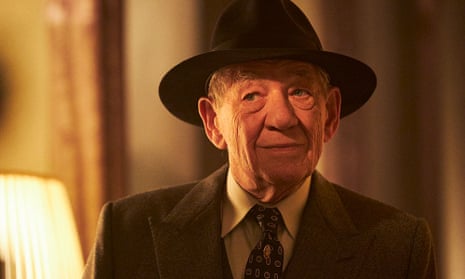Following on from his role as a violent career criminal killing and stealing his way through London’s underbelly in the charmingly deranged thriller The Good Liar, Ian McKellen is one-upping himself by playing an even more odious figure: a critic.
In the Hilary and Jackie director Anand Tucker’s hit-and-miss thriller The Critic, Jimmy Erskine is the most feared and famous theatre critic in 1930s London, saving his most savage takedowns for Nina Land (Gemma Arterton), an already unsure leading lady. He takes pleasure in ritually tearing her down, a practice that has further eroded her fragile sense of confidence. As a gay man forever at the mercy of laws that prohibit his very existence, Jimmy is living life on the edge, indulging in rough sex in the park with strangers while showboating his flamboyance in writing. But when his newspaper’s proprietor dies and his son (Mark Strong) takes over, Jimmy is told to be careful, to avoid falling foul of his new boss by cutting down on the cattiness and when his job security becomes even more precarious, he’s forced to turn to Nina for help.
Marking the first screenplay from Patrick Marber since 2006’s Notes on a Scandal, The Critic is a welcome return for a writer unafraid to confront people’s most horrible impulses. Marber’s writing shares a sharpness with Jimmy’s and while The Critic might seem somewhat soft in comparison to his previous scripts, that’s only because they went so much harder than most would ever dare (we’re not quite at “fuck off and die you fucked up slag” level but Jimmy does say Nina has a “fat arse”). The many withering critiques of Nina’s acting (“replace damp squib with wet blanket!”) provide a great many laughs and there’s a real infectious sense of debauched fun to the world that’s set up, tagging along with McKellen’s vile and self-important egotist drunkenly parading around the West End, handsome man and notebook in tow.
The relationship between artist and critic is a rather unexplored one and Marber avoids easy psychology, with one thoughtful, effective monologue explaining why a greater love for an art form can lead to a harsher response, a feeling of betrayal when someone isn’t giving you their everything. But how far is too far and how much fun should one get from pushing those limits? The interesting questions being asked (which also prod at Jimmy’s predilection for dangerous sex and Nina’s desperate need to be validated) don’t need clear answers, but the film could afford spending a bit more time pondering them. Too quickly the earlier, spikier dark comedy is shelved and replaced with a more conventional crime-thriller plot based around infidelity and a scheme of such little complexity that we start to lose investment in how it all plays out. As the bodies pile up, one might find themselves missing the far more compelling danger of a bad review instead.
The fizz of the first half might not go completely flat in the second but that’s only because of McKellen, who relishes another devious character to sink his teeth into, devouring every scene, a deliciously caustic turn that will provide him with nothing but the finest notices. While it’s a pleasure to see Arterton proving to be a more than a match for him, an actor whose career continues to blossom the further she is from her blockbuster days, the film wastes both Romola Garai (effectively horrid in a handful of moments) and the wonderful Lesley Manville as Nina’s mother in just a few scenes (all of which she nails, of course, including her frantic search for a compliment when Arterton asks for her opinion after a show, calling her performance “audible”).
Even though Marber’s script ends up at a far graver place, there’s less emotional depth to his characters than in Closer or Notes on a Scandal and so a last act bid for profundity after a string of unmoving deaths is a big miss. The Critic is far more fun when it’s words rather than sticks and stones causing damage.
The Critic is screening at the Toronto film festival with a release date to be announced

Comments (…)
Sign in or create your Guardian account to join the discussion